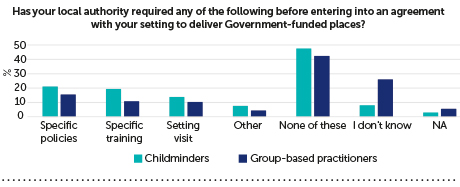
PACEY survey reveals LAs making requirements of settings contrary to Government guidance
Early years providers are being asked to adapt their policies and undergo training by their local authority (LA) before they are able to offer the funded hours, reveals research from PACEY.
PACEY also said it was continuing to hear reports of LAs placing requirements on providers to deliver the 30 hours despite Government guidance to the contrary.
Of the respondents answering the question on LA requirements within the 30 Hours: one year on report:
- 21 per cent of childminders and 15 per cent of group-based practitioners said they had to provide specific policies before signing agreements to deliver funded places.
- 19 per cent of childminders and 11 per cent of group providers said they had to undergo specific training.
- 14 per cent of childminders and 10 per cent of group providers said their setting was subject to a mandatory quality visit (see chart).

30 Hours: one year on is the first of two reports based on findings from PACEY’s annual Building Blocks survey. Carried out between March and May 2018, the survey received 2,129 responses from childcare practitioners, the majority of whom worked in childminding settings (85 per cent).
Examples from respondents of LA requirements include having to amend policies, send admissions policies, charging models, and sample invoices for local authority approval. One childminder said she was required to take out £10m worth of public liability insurance in order to deliver funded places. Another LA required settings to be subject to a two-hour setting visit.
Since 2013, it has been a legal requirement that LAs pass on the funding for early education places to providers and not undertake separate assessments.
Financial impact
While PACEY’s report shows more providers, especially registered childminders, are offering the 30 hours, for many it has reduced their income. As such, just under a third plan to limit the number of places they offer in the future.
A total of 64 per cent said the hourly rate paid to providers is too low. Many providers said they felt they had to offer the extended hours in order to keep existing parents.
When asked about the long-term sustainability of the 30 hours, views were more mixed, however. Around 39 per cent (44 per cent of childminders and 38 per cent of group providers) agreed that it will not be sustainable for their setting, while a quarter disagreed.
One childminder said, ‘I’m seriously contemplating giving up being a childminder over the next couple of years because of the 30 hours. I’m an Outstanding provider who has worked hard to improve my practice and bending over backwards to please Ofsted. Now, I’m being forced to work for less than minimum wage. No thanks.’
A pre-school practitioner in London said, ‘Long-term it is not sustainable, especially for smaller chains or independent settings. Though the funding has not reached critical levels in my own setting, the 30 hours has affected profit slightly.’
Payments
Respondents were also asked whether they have experienced difficulty receiving payment from their LA. Just under a quarter of childminders and a fifth of group-based practitioners indicated they had.
One childminder said, ‘The biggest bugbear is waiting for the LA to pay us.’
The findings also suggest that just a fifth of LAs were paying monthly, despite Government guidance stating LAs should pay providers monthly by this September. A childminder said, ‘The worse bit by far is not being paid monthly. It makes it very difficult to budget and difficult to cope with for a sole earner.’
Despite Government suggestions that the 30 hours may make it easier for providers to fill vacancies, PACEY’s survey indicates otherwise. Just 14 per cent of respondents agreed with the statement, ‘As a result of delivering the 30 hours, my setting has been able to fill more places.’ Nearly half of all respondents disagreed.
Recommendations
In light of the findings, PACEY is continuing to call on the Government and LAs to:
- review providers’ rates for delivering funded hours on a regular, preferably annual, basis to ensure it is sustainable, keeps pace with inflation and takes account of providers’ changing costs
- pay providers monthly as soon as possible
- ensure LAs streamline paperwork requirements and adhere to the new statutory obligation to remove wide variations in provider requirements to deliver the entitlement
- allow childminders to deliver the funded places to related children not living at the same address
- ensure LAs, children’s centres and health visitors promote childminders as an option to parents seeking a funded place
 Liz Bayram, chief executive of PACEY, said, ‘Our latest Building Blocks research is a stark reminder of how many [providers] are actually losing money. The Government has said it will look at funding levels for 2020 onwards as part of the Comprehensive Spending Review, but that is two years off.’
Liz Bayram, chief executive of PACEY, said, ‘Our latest Building Blocks research is a stark reminder of how many [providers] are actually losing money. The Government has said it will look at funding levels for 2020 onwards as part of the Comprehensive Spending Review, but that is two years off.’
A Department for Education spokesperson said, 'We are supporting as many families as possible with access to high-quality, affordable childcare, doubling our free childcare offer to working parents to 30 hours a week and saving them up to £5,000 a year per child.
'The Department’s statutory guidance on early education and childcare sets out our expectations between local authorities and providers and there must be a good reason for departing from this guidance.'









